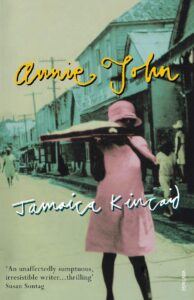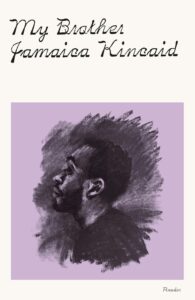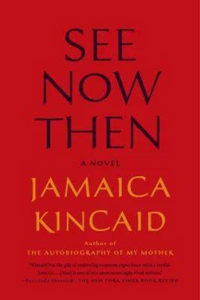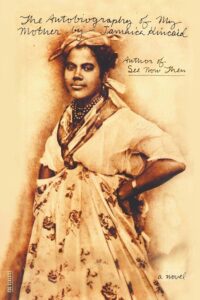
This summer, the novelist and essayist Jamaica Kincaid released a career-spanning collection. Covering forty years—from her early days as a precocious New Yorker staff writer to her present perch as a “fiery postcolonial critic”—the work in Putting Myself Together describes an author’s evolution. It’s also a welcome reminder to spend some time with one of our living greats.
I first met Kincaid’s work under that shady umbrella we call “the writer’s writer,” but her fans criss-cross continents. She’s quietly built a career on a commitment to honesty, un-flashy insight, and calibration. Kincaid has the rare ability to shift between aloof, emotionally-distant narrators and a warm autobiographical register.
Early work personalizes the effects of colonialism, while later projects burrow inward. She’s as frank dissecting unhappy families as she is extolling the pleasure of gardening, or New York nightlife in the 80s. And in short stories and doorstops, her attention is ruthless and unflinching.
If the essays are tempting but daunting, I recommend starting in the back catalogue. Here are five Jamaica Kincaid books to kick-start a fresh fan.

Part of Kincaid’s genius is a knack for compression. This book-length essay draws readers into Antigua, her native country. A pithy missive to travelers from “large” places peppered with loving details (and cautions for the thoughtless tourist), this one makes for a good intro to Kincaid’s nonfiction voice.

This was the first Kincaid novel that I happened to fall for. Here we find another dense, short work—and one that introduces one of the author’s life-long subjects, Caribbean girlhood. Following the spirited Annie as she muddles through a St. John childhood, this is a wise and winsome coming-of-age story delivered in perfect slice form. Another great place to start.

Kincaid’s brother, Devon Drew, died of AIDS in 1996 at age 33. This gut-punch of a memoir—a finalist for the 1997 National Book Award—is a chronicle of his brief life. Kincaid frames a complex remembrance with recollections of her family’s early life in Antigua. Called bracing and raw on its initial release, the book got a beautiful reissue from Picador last year. And booksellers from City Lights to Shakespeare & Co continue to praise its searching, “poetic prose.”

A domestic novel that was close-read on release for ostensibly autobiographical elements, See Now Then considers a long marriage on the rocks. Plotless, poetic, and devastating, the subject here is alienated affection. But in Kincaid’s steady hands, the pain of a long union is made hypnotic.
Kincaid told FSG’s Jonathan Galassi that this novel is in direct conversation with the first story she published, “Girl…which is one sentence and 300 words long.” And according to the author, both projects come from a wish “to reconcile the person I was with the person I am with the person I will be.”

This novel centers a (yes, fictional) Caribbean woman: Xuela Claudette Richardson. On the edge of seventy, Xuela is reflecting on her turbulent life. The unsatisfying partnerships and the chilly childhood, not-so-nurtured under British colonialism. The prose in this quiet, forceful epic exemplifies Kincaid’s trademark sharpness.
In her New York Times review, Cathleen Schine called the book “shocking” and “elegant,” but noted its force. As a stand-in for the colonized subject, Xuela offers “a brilliant fable of willed nihilism.” But she’s deliberately tough company.
Welcome to the club, new fans. The water’s warm.
